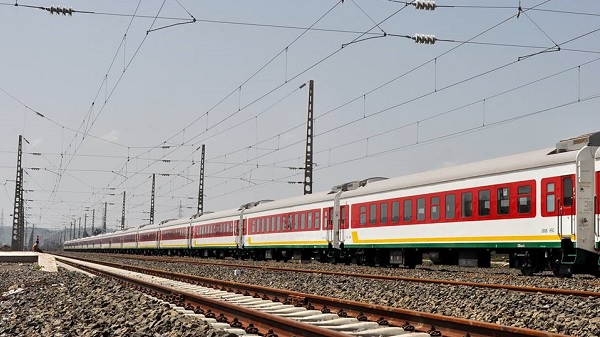
We came to Ethiopia to report on Africa’s first fully electrified cross-border railway line, a Chinese-backed project stretching more than 450 miles from Addis Ababa to the Red Sea port of Djibouti.
By Jonathan Kaiman & Noah Fowler (Pulitzer Center)
BISHOFTU, Ethiopia–The shoe factory felt endless. Thousands of Ethiopians in yellow and red jumpsuits sat in neat rows beneath a cavernous ceiling, assembling, inspecting, and packaging women’s shoes. Overhead, red banners flaunted slogans in English, Chinese, and Amharic, Ethiopia’s national language.
“To enlarge career platform for China and Africa employees,” said one. “To live and work in peace and contentment.”
The China-based Huajian Company employs 6,000 workers in Ethiopia, churning out shoes for Guess, Tommy, Mark Fisher, and other American shoe brands. Huajian is bullish on the country, where labor is cheap and the government is China-friendly; it hopes to expand its Ethiopian work force to 50,000 people within eight years.
We came to Ethiopia to report on Africa’s first fully electrified cross-border railway line, a Chinese-backed project stretching more than 450 miles from the country’s capital Addis Ababa to the Red Sea port of Djibouti. Although the line hasn’t opened yet, Ethiopian officials hope it will turn the impoverished, landlocked country into a manufacturing powerhouse, not unlike China in the early days of its industrial boom.
We’d been reporting on the railway for two days when we decided to visit the factory. Fortunately, the company’s CEO Zhang Huarong was in Ethiopia on an inspection tour, and he agreed to an interview.
Zhang stood to benefit tremendously from the new rail line. But almost immediately, he shifted the conversation towards America.
“I hope that America, over the next 50 years, stops only considering its aircraft carriers, and starts using its technology to help the whole world develop together,” he said. At first I took the statement as a dull platitude—in my six years as a China correspondent, I’ve heard countless Chinese officials express similar sentiments. But then I thought about his clientele.
Every pair of shoes produced in his factories, both in China and Ethiopia, is exported to the U.S., he told us. President Donald Trump’s increasingly bellicose rhetoric on China may have spooked him; if Trump, acting on a campaign promised, slapped a tariff on Chinese-manufactured goods, Huajian would surely suffer. His words may have been less of a platitude, and more of a plea.
Read the complete story at Pulitzer Center
——
See also:
- How Does Kenya’s New Railway Compare with Ethiopia’s?
- Ethiopia–Djibouti Railway: A First Step to Trans-Africa Railway?
- Ethiopia to Open Its First Trans Boundary Railway Link to Djibouti
- VIDEO: Commercial Rail Begins Service from Addis Ababa to Dire Dawa
- Turkish Company Yapı Merkezi Eyes More Africa Projects after Ethiopia, Tanzania Railways
